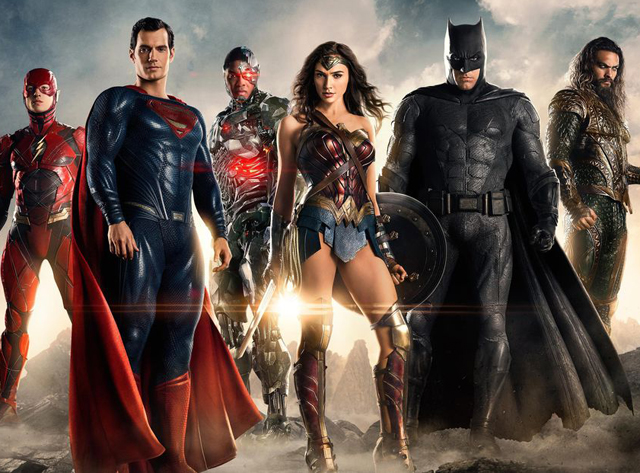
Roll back the clock to the mid 2000’s and the cinematic landscape was very different for movies based on comic books. DC was still trying to find it’s footing again after the disastrous implosion of their Batman franchise with Batman & Robin (1997) while at the same time Marvel had their many characters scattered around Hollywood at multiple studios. Then in 2005, Christopher Nolan launched onto the scene with his grounded re-imagining of the Batman character with Batman Begins. The movie was both a financial success as well as a critical darling, which made Hollywood realize that comic book movies could be so much more than just standard popcorn entertainment. Which then led to the year 2008, which was a touchstone year for the genre as a whole because it not only saw the premiere of Nolan’s monumental second film in what would be his Dark Knight trilogy, the iconic The Dark Knight, but it was also the year that Marvel premiered Iron Man, the first film in the ambitiously planned Marvel Cinematic Universe. While Christopher Nolan’s trilogy was winning praise from audiences and critics alike, Marvel was also gaining attention for their attempt at a connected universe through multiple franchises centered around their different characters, and with the acquisition of Marvel by Disney, the comic book giant now had a home base to put that plan together without too much intereference. This plan culminated in the team up film called The Avengers (2012), which broke multiple box office records, including those set by The Dark Knight. Hollywood had now seen the concept of a cinematic universe work on a massive scale and many of the studios were eager to repeat the magic that Marvel had managed to conjure up. It would seem that DC would be in the best position to match what Marvel had achieved, given that they had their own stable of iconic super heroes and were also riding on the high of Nolan’s Dark Knight trilogy at the time.
But, as many would find out, it was almost impossible to repeat the same formula as effectively as Marvel had been doing. Even as many of the studios were trying to form their own cinematic universes, Marvel continued to build with every new phase. Universal failed in spectacular fashion with their “Dark Universe” based on their stable of movie monsters. Sony, clinging heavily to their rights to the Spider-Man franchise, have put out numerous failed projects centered around as many superfluous characters in the Spider-Man orbit as they can, with only the Venom films being mildly successful. But no other studio tried harder to compete with the likes of Marvel than their rival DC. Under the corporate umbrella of Warner Brothers, the DC Comics Studio was given a significant spotlight in the wake of the success of the MCU. The pressure was on to have the DC characters to have a cinematic universe of their own that would be on par with Marvel. But the question remained, who would be the one to lead the charge. At Marvel, the reigns of the cinematic universe were not held by one film director, but rather by the head of Marvel Studios Kevin Feige, who delineated with his inner circle what stories would be told and how all those story thread would be woven into a larger story. Who would be DC’s Feige then? After completing his trilogy with The Dark Knight Rises (2012), Christopher Nolan was ready to move on and work on other projects he was interested in like Interstellar (2014) and Dunkirk (2017). DC and Warner Brothers instead turned to another one of their rising star filmmakers to help set the tone for their planned universe. That filmmaker was Zack Snyder, who just a few years prior made a statement for himself with faithful adaptations of graphic novels such as 300 (2007) and Watchmen (2009). With Marvel leaning more into the colorful and comedic, it was decided that DC would lean more into the dark and dramatic in order to differentiate their universe, which Snyder was a good match for. And so, the beginning of the DC Extended Universe was set. But, as we would see, Cinematic Universes don’t always go as planned.
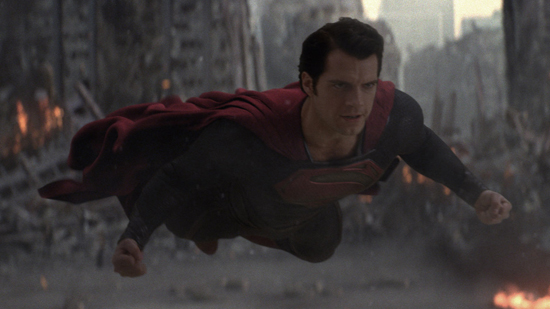
MAN OF STEEL (2013)
Directed by Zack Snyder
There are many factors that went into making the Marvel Cinematic Universe (MCU) the runaway hit that it was, but one of the undeniable factors of it’s success would be the solid foundation it was built upon with the success of it’s first film, Iron Man. Had that movie not worked, it would have poured water on the whole plan moving forward. So, a lot was resting on the results the movie that would launch the DC Extended Universe (DCEU). It’s only logical that the starting point for this multi-year, multi-film plan would have to involve the most iconic super hero in the entire DC stable; Superman. Superman of course already had a strong cinematic background before, with the classic Richard Donner directed/ Christopher Reeve starring 1978 original being seen as the film that launched this genre in the first place. But, after the disaster that was Superman IV: The Quest for Peace (1987), the “man of steel” had been on a lengthy hiatus on the big screen. The well-intentioned but ultimately dull Superman Returns (2006) likewise cast doubts on Superman’s box office viability. But, his story does offer a great starting point to launch a cinematic universe, given that Superman is the world’s most recognizable super hero. What DC wanted to do this time was to ground Superman in the same way that Christopher Nolan had with Batman. Zack Snyder could certainly bring that grittier style that was needed, but is that a good fit for the character of Superman? There are a lot of questionable choices made in Man of Steel, chief among them would be what was seen as gratuitous violence that felt out of character for Superman. The film was controversial for it’s time given that the resulting fight between Superman and the villainous General Zod leaves the city of Metropolis in a smoky ruin, with uncomfortable echoes of the devastation of 9/11. Also, Superman ends up stopping Zod by killing him, which according to comic book lore is very much the antithesis of Superman’s pure hearted character. To many people, Snyder’s approach to the character seemed to more self-serving of the director’s style and less in line with who Superman should be. But, the movie still managed to succeed at the box office, no doubt riding the crest of the wave made by the success of The Avengers and The Dark Knight Rises a year prior. The movie also won praise for it’s casting of Henry Cavill as Superman, who most considered to be a strong choice, along with the casting of Michael Shannon as Zod. But, the true test of the longevity of the DCEU would depend on what Snyder would do next as a follow-up.
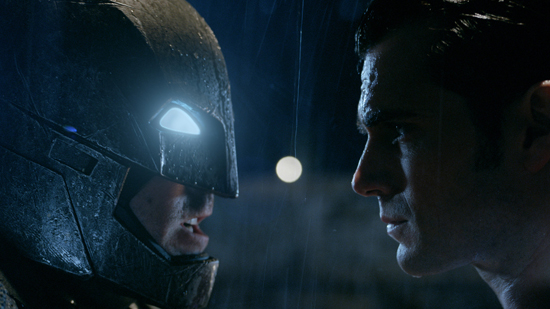
BATMAN V. SUPERMAN: DAWN OF JUSTICE (2016)
Directed by Zack Snyder
Despite there being mixed opinions about the Man of Steel’s treatment of the Superman mythos, people were still thrilled to find out that the next film in the DCEU would see Superman going head to head with the Dark Knight himself in his next film. Not only that, but this would be the clearest indication yet that were on our way to seeing the first true assembling of the Justice League on the big screen. Plus, we would be getting our first post-Dark Knight version of the Batman, which it turns out would be heavily influenced by the famous Frank Miller run of the character in the comic books. There were a lot of naysayers at the time when it was announced that Ben Affleck would be playing the caped crusader, but as it turns out, it would be the best choice Zack Snyder made for the whole movie. While Snyder had the ingredients to make one of the most iconic comic book movies of all time, he sadly didn’t have a compelling story to center his movie on. The key problem with BvS is that the whole plot to get his super heroes to fight one another is convoluted and non-sensical. All of the story problems that plagued Man of Steel are amplified here, and the biggest problem of them all is the horrible mismanagement of the character Lex Luthor. Luthor is one of DC’s most iconic villains, and most well known as Superman’s arch-nemesis. Here he is played by Jesse Eisenberg who from the get go you can tell was horribly miscast. His personality type is not at all like the cool, calculating super genius of the comic books, and it almost seems like Eisenberg’s direction with the character was to make him closer to the Joker with his out of place manic outbursts. You can also see the flaw in DC being too heavy-handed with their expanded universe plans, as too much of the movie feels like a set up for future movies, especially in a painfully mediocre sequence where we see our first glimpses of Ezra Miller’s Flash, Ray Fisher’s Cyborg, and Jason Mamoa’s Aquaman. At least Wonder Woman does get something to do in this movie, as the heroine (played by Gal Gadot) joins the other two heroes in the final battle; and I won’t lie, the money shot of DC’s holy trinity of Superman, Batman, and Wonder Woman all standing together on the battlefield is pretty incedible. Sadly, all the other potential is wasted as Snyder’s style over substance tendencies undermine any connection we have with the characters. That’s why there was significant doubt about the future of the DCEU moving forward after this, as the movie was critically panned across the board. It also didn’t help that Marvel released Captain America: Civil War (2016) a few short months after, showing the same concept of super heroes battling each other, but done much better.
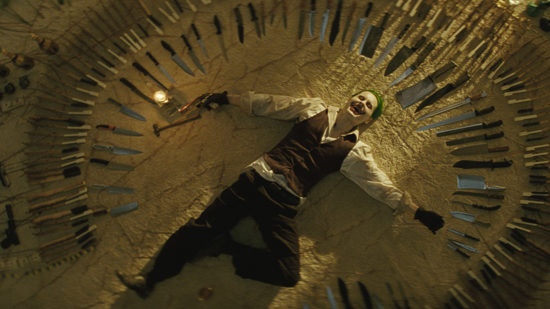
SUICIDE SQUAD (2016)
Directed by David Ayer
If the heroes weren’t going to save the DCEU from floundering, than how about the villains. Before the Justice League assembled on the big screen, we were presented with this team up of villains from across the whole DC rogues gallery. The concept of the Suicide Squad from the comics is that when the government deems a situation too dangerous to risk the lives of their strongest heroes, they send in a team of criminals who lives they don’t mind sacrificing for the sake of the greater good. It’s a fun concept that offers DC a chance to make use of the deeper bench of their collection of characters, many of whom would be making their big screen debuts. This also being the first film in the DCEU not helmed by Zack Snyder also offered people the chance to see what a different directorial vision would look like in this cinematic universe. David Ayer, who previously won acclaim for the films End of Watch (2012) and Fury (2014) seemed like a good choice, as his style matched the grittier tone that DC wanted to continue, but was different enough from Zack Snyder to show more diversity of vision within the cinematic universe. Again, like the movies that came before, DC had done a good job with their casting. Will Smith gave a devilishly charismatic portrayal to the sharp-shotting Deadshot. Margot Robbie seemed to have been born to play Harley Quinn. And perhaps the most outstanding casting choice of them all, and the sole actress from this era to outlive the DCEU in this role, Viola Davis as the ruthless Amanda Waller, the squad’s agency handler. But, not everything seemed to work out as planned; the common refrain of the DCEU thus far. While the movie does work better than the Zack Snyder films in general, it also is frustratingly all over the place in tone. Apparently during post-production, David Ayer had the film taken away from him and re-edited by the studio to give it a more comedic tone. This was due in part because of the competition with Marvel, which had achieved enormous success with the mix of humor and action in Guardians of the Galaxy (2014). It’s sadly ironic that years later, DC would tap James Gunn himself to direct the Suicide Squad sequel instead of David Ayer, who to this day insists on having his original cut see the light of day. This was yet another example of DC’s inability to adequately build a cinematic universe, mainly due to them continually playing catch-up to Marvel.
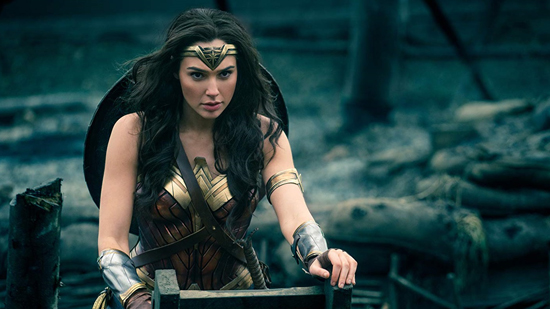
WONDER WOMAN (2017)
Directed by Patty Jenkins
Three movies in, and the DCEU’s future was on shaky ground. Their movies were performing well at the box office, but critically they were far behind where Marvel was. And there seemed to be a lot of doubt whether their next film could pull them out of the slump, given that it centered on a heroine that up to now had never carried a film on her own before. Wonder Woman carried a lot of uncertainties, given that no super hero movie before had centered on a female super hero, nor had been directed by a woman. And Patty Jenkins, the director, had never attempted a film on this scale before, with her only film prior being the small independent flick Monster (2003). And yet, with all of those factors weighing against it, Wonder Woman defied all expectations and became a critical and commercial success. Many people point to this as the film that saved the DCEU (at least for a while) and it’s clear to see why. For one thing, it is the first DCEU with a consistent tone and a cohesive story. Set during WWI, it finds the Amazonian princess Diana brought into the human world in a quest to stop all wars by defeating the God of War, Ares. Accompanied by her human guide Steve Trevor (a perfectly cast Chris Pine) we see Diana grow into the hero that we know as Wonder Woman, which Gal Gadot brings so much charm into, and that proves to be the key to the film’s success. For the first time in the DCEU, we finally see a hero take action and use their powers in an unselfish way. Patty Jenkins apparently fought to keep the No Man’s Land sequence in the film against the wishes of DC and Warner Brothers, and it’s wonderful that she did, because that’s the part of the movie where we see the super hero become who she was destined to be. That’s what the DCEU had been missing before; the reminder that these heroes are larger than life and worth being inspired by. It also helps that Patty Jenkins seems to have that reverence for the character as well, in a way that never feels artificial and surface level like it does with Zack Snyder. And it also not only marks the first time that DC not only matched Marvel in their quality, but in some ways even surpasses them. It would be two more years before Marvel had it’s own female led super hero movie with Captain Marvel (2019), so DC can proudly claim that they were the first to reach that benchmark. Thankfully, it was also a benchmark that finally was worthy of the character and fulfilled the long awaited promise of seeing Wonder Woman brought to cinematic life.
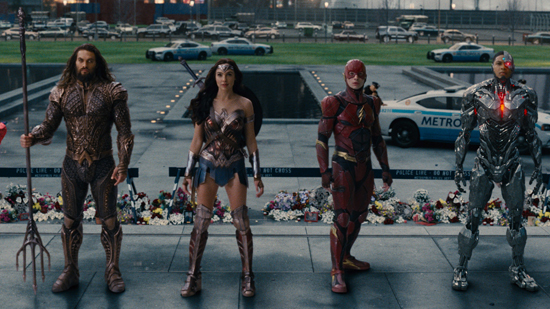
JUSTICE LEAGUE (2017)
Directed by Zack Snyder and Joss Whedon
But, just as quickly as Wonder Woman was able to put the DCEU on the right track, the Justice League pretty much immediately derailed it once again. This film is notoriously known as one of the most troubled productions in movie history, and all of that misfortune is clear to see in the theatrical cut that we saw in the Fall of 2017. Still reeling from the inability to compete with Marvel year after year, Justice League went through numerous rewrites and reshoots throughout it’s production, with DC constantly second-guessing itself. Originally planned as a two part event, DC decided to take the full four hours of content that Zack Snyder had assembled in his cut, and demanded it be whittled down into a theater friendly two hour cut. Unfortunately, a family tragedy prevented Snyder from being available to restructure the film according to those new demands in order to meet the deadline, so it was decided to give the film over to someone else. That someone would be Joss Whedon, the man who delivered a monster hit for Marvel with The Avengers. If he could assemble the Avengers successfully on screen, surely he’d do the same with the Justice League, right? It turns out Whedon’s magic touch couldn’t save the sinking ship of the Justice League; if anything he made things worse. Costly re-shoots didn’t give any added coherence to the story, but instead only added awkwardly shoe-horned jokes into the mix. And in the years since, stories have come out about how bad of an experience the re-shoots were for the actors involved. Ray Fisher and Gal Gadot pointed out the abusive and belittling behavior Whedon directed toward them on set, with Fisher pointing out how his Cyborg character (who was the main focus of Snyder’s cut) seemed to be diminished in the story completely in what seemed like retaliation from Whedon. Joss Whedon’s reputation has never recovered from this disastrous production, and DC and Warner Brother’s bad decisions on this film would have a ripple effect across the remainder of the DCEU, particularly with fans. I didn’t even get to the other problems with the movie, from Henry Cavill’s awful CGI upper lip to the bad animation of the villainous Steppenwolf. Snyder still received sole directorial credit, but it’s unfair to call this his movie as it is more DC’s and Joss Whedon’s mess. Of course, Zack Snyder would have his final word in the end, but that will have to wait for Part Two.
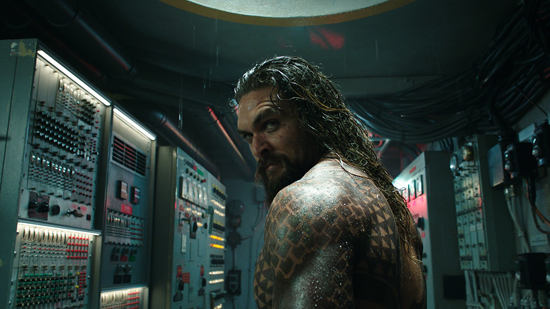
AQUAMAN (2018)
Directed by James Wan
If you were to make a guess as to which DC super hero would emerge as the box office champion in the DCEU from the outset, I don’t think anyone would’ve picked Aquaman. But that’s exactly what happened. Aquaman was the only DCEU film to ever cross the billion dollar mark at the worldwide box office, which was a welcome result for DC and Warner Brothers after they saw Justice League flame out the year before. One thing that probably helped Aquaman get to a billion dollars was because it came out in the year that you could say was the peak of the super hero genre; 2018. This was the same year that saw the record breaking success of Black Panther and Avengers: Infinity War from Marvel. But it wasn’t just Marvel Studios making a killing. Sony was also making a killing with their Spider-Man villain spin-off Venom, starring Tom Hardy, as well as their critically acclaimed animated film Spider-Man: Into the Spider-Verse. It was just the best time possible to have a super hero movie in theaters, and Aquaman was in the right place at the right time. It also helped that Jason Mamoa was a genuine magnetic star who was more than capable of carrying a movie like this on his huge shoulders. The film was definitely a big departure for director James Wan, who was better known up to this point for his work in horror, being the architect of the Saw and Conjuring franchises. In my own personal opinion, I felt that Wan’s vision was a little scattershot in bringing the world of Aquaman to life, as the story feels overstuffed with too many elements. It’s like Wan thought he was only ever going to get one shot at making an Aquaman movie, so he was determined to put it all into this movie. There’s one too many villains in this film, with Aquaman battling both of his comic book nemeses, Oceanmaster and Black Manta. The finale is also a CGI overload that is often hard to follow. But, I know my opinions are in the minority as audiences still ate this movie up, and helped to elevate Aquaman into the upper tier of cinematic super heroes. It also helped to secure the survival of the DCEU for a bit longer, especially in the wake of Marvel hitting it’s own mighty crescendo.
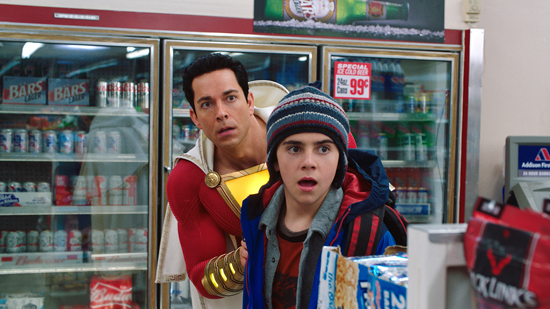
SHAZAM (2019)
Directed by David F. Sandberg
If I were to select a film out of the DCEU that would be my own personal favorite, it would be Shazam. I think that this is the movie where DC finally hit the right note with their cinematic universe. The movie was grounded yet still magical, funny without feeling forced, and more than anything represented what a DC film could be without living in the shadow of the Marvel. This was what the DCEU should have been from the beginning. It doesn’t hit you over the head with the heavy metaphors and symbolism of Zack Snyder’s films, nor has the awkwardly laid in humor of what Joss Whedon brought to Justice League. It’s just a charming story told with enough visual imagination to make it feel like a true comic book come to life. The character of Shazam was always going to be a tricky one to pull off, so it mattered a lot in how they would cast the character, in both forms. Teenage actor Asher Angel brings enough likable charm to the role of Billy Batson, and even manages to do well in the dramatic moments as he frantically tries to discover who he is after being orphaned as a child. When he transforms into the super being Shazam, Zachary Levi takes over and does a magnificent job of portraying a teenager in a grown man’s body, with often hilarious results. Helping to bridge the performance between the two actors in the role is the perfect chemistry both have with the character Freddy Freeman (played with perfect comedic chops by Jack Dylan Grazer). What especially helps this movie to soar unlike so many of the other DCEU films is that it doesn’t feel as labored as the others. This movie seemed to be detached just a bit more from the DCEU master plan, so it was able to stand out more and be it’s own thing, which helps the movie as a whole to feel more like a complete vision rather than just a cog in the machine. This is what also helped Wonder Woman to stand out too, with the greater vision of the cinematic universe not getting in the way of telling a stand alone story. The fact that they could do this with a character as obscure in the DC pantheon as Shazam just goes to show that when done correctly, any super hero can work on the big screen. You just need to combine comic book action with a compelling story, especially one that’s an inspiring coming of age narrative like in this film. At this point in time, it also looked like DC was set to compete with Marvel on relatively strong common ground in terms of tone and story. But, the turn of the decade would bring it’s own challenges.
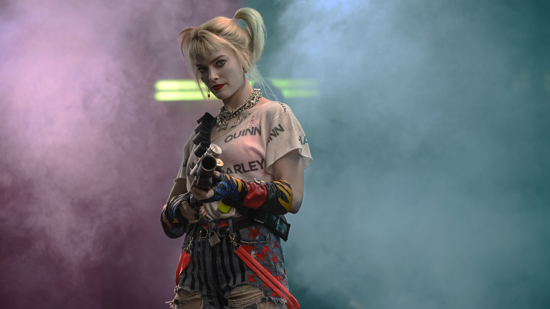
BIRDS OF PREY AND THE FANTABULOUS EMANCIPATION OF ONE HARLEY QUINN (2020)
Directed by Cathy Yan
The mouthful that is this movie’s title gives you a bit of an indication of the whirlwind of mayhem that this movie ultimately ended up being. It follows up the events of David Ayer’s Suicide Squad, but also goes out of it’s way to indicate that this is very much not a sequel. The movie was mainly produced to be a showcase for Margot Robbie in the role that turned her into a star. Most people just refer to this as the Harley Quinn movie, and that’s an apt description. She is undeniably the centerpiece of the movie, with the titular super girl team being the background players. Margot Robbie makes the most of this film, as she is a hilarious delight playing Harley Quinn in all of her madcap madness. Of all of the DCEU films, this is the one that is undeniably a comedy first and foremost; with the Deadpool films being the closest spiritual inspirations to this movie in the genre. Unfortunately, this tone made the movie receive a mixed reception from fans who were not fully on board with this kind of cartoonish shift in tone for the DCEU. It was also the first DCEU film released theatrically with an R-Rating, which also was a major shift in strategy for DC. If you take it on it’s own outside of it’s place in the DCEU, this movie is a fun subversion of the super hero genre, with Margot Robbie’s game comedic chops delivering a lot of laughs along the way. But, this was at a point when the DC fandom itself was greatly fractured, with the “Release the Snyder Cut” movement hitting it’s highest point and Zack Snyder stans angrily rejecting the sillier tone that this movie was starting to put forward. Sadly, a lot of factors worked against Birds of Prey’s favor, especially the looming disaster that was the Covid-19 pandemic that ultimately cut it’s time at the box office short. Of all the official DCEU films, this is the one that most people forget about, and it’s too bad because on it’s own it’s a funny little film with a hilarious performance by Margot Robbie as Harley. I would like to think that the confidence she built as a comedic performer in this film and the Suicide Squad movies would eventually help her deliver the iconic work she did in Barbie (2023) a few short but arduous years later.
At this point, we break this overview of the DCEU into separate halves. These first few years show DC struggling to find their way into getting a cinematic universe to gel together on the big screen with a lot of bad choices in the beginning leading to some gradual successes. The second half of this retrospective, which I will get to later this year, will show how the DCEU inevitably came apart in a post-pandemic world, leading to what now will be a complete overhaul and reboot. You may wonder why I didn’t include the Oscar-winning Joker (2019) starring Joaquin Phoenix in my retrospective. This is because DC themselves have classified that particular film as an “else-worlds” story disconnected from their cinematic universe storyline; so it doesn’t count as an official DCEU film. The same will still apply to the Matt Reeves directed The Batman (2022), which opened alongside the second half of movies in the DCEU slate. What is definitely clear from the overview of movies in this article is that DC was consistently running from behind in the race against Marvel, and they never quite caught up to their rival. Though there were certainly bright spots with Wonder Woman, Aquaman, and Shazam, the fact that the build-up and failed execution of a Justice League movie clouded so much of their reputation just showed that the DCEU was always doomed to fail. More than anything, it was the mess that was the Justice League movie that dragged everything down with it. But it can also be said that the lackluster results of Man of Steel may have caused the ripple effects of failure from the very outset. The Hall of Justice could never stand on a faulty foundation. Even with all that, the DCEU still gave us some individually strong movies that are still worthwhile to watch on their own. This, as I’ll point out in Part Two, is even true of some of the movies in the back half of the DCEU, even if they failed to deliver at the box office. I will always be entertained by the charming innocence of Shazam, and the inspiring heroism displayed in Wonder Woman. The latter’s No Man’s Land sequence I would argue stands up as one of the greatest scenes ever in a super hero movie, right alongside iconic moments like the train fight in Spider-Man 2 (2004) or the Airport fight scene from Marvel’s Civil War. The story of the DCEU still has more stories to tell, but from these first eight films, the definite impression left behind is one of valiant efforts made to work with a flawed plan that was never going to pan out like it was intended to.